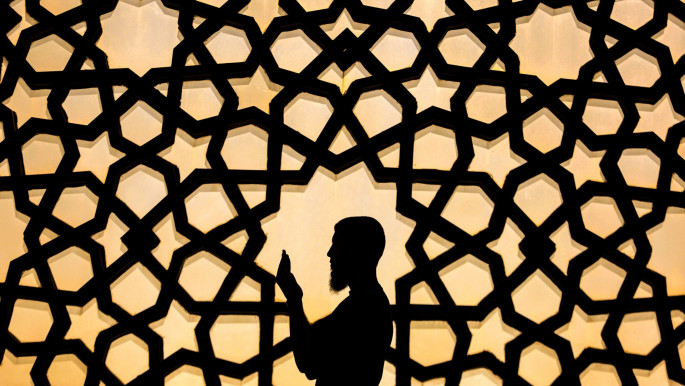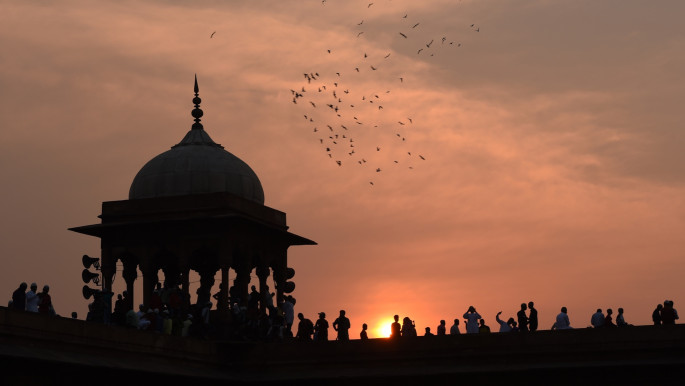British Muslims go digital for socially-distanced Ramadan
A group of tech-savvy British Muslims has seized the unique opportunity provided by this 'socially-distanced' Ramadan to channel their digital skills towards helping communities stay connected.
5 min read
Technology is changing Ramadan under lockdown. [Getty]
For millions of Muslims around the world living under lockdown, this Ramadan is unlike any they have experienced before.
Restrictions on movement introduced by governments to combat the Covid-19 pandemic mean the traditions of large family iftars, group prayers at the mosque, and public celebrations are now off-limits.
In the UK, a group of tech-savvy British Muslims has seized the unique opportunity provided by this "socially-distanced" Ramadan to channel their digital skills towards helping communities stay connected and create new traditions during the holy month.
Over the final weekend before fasting began, developer network Deen Developers hosted a remote hackathon that challenged teams of tech whizzes from across the country to create apps on the theme of 'Ramadan at Home'.
"It's about inspiring people who work in tech to use their skills to give back to the community," Ibrahim Javed, a technology consultant and founding member of Deen Developers, told The New Arab.
OnKhair, one of the five apps to come out of the hackathon, provides a unified platform for mosques and Islamic organisations to live-stream the religious lectures, lessons and conferences that would usually attract large crowds during Islam's holiest month.
"Many of us kept receiving invites to these lectures on social media and ended up with loads of posters on our phones but no central place to know what's going on and when," said Imane Kaddo, who is part of the team behind OnKhair.
 |
For millions of Muslims around the world living under lockdown, this Ramadan is unlike any they have experienced before |  |
The app aims to ensure resources for religious and Quranic study - an important practice for Muslims during Ramadan - continue to be available despite the closure of mosques and Islamic centers.
Read more: Ramadan, fasting and Covid-19: Your medical questions answered
"We can't go to our masjids (mosques), but we can learn from home and connect with other people remotely," Kaddo said. OnKhair provides a fully interactive experience, with viewers using live chats to interact and ask questions of the imam or sheikh delivering the lecture, thanks to social media and web conferencing platforms like Zoom. |
|
| Read more: How coronavirus has changed the way Muslims celebrate Ramadan |
Once strict social distancing measures are lifted, Kaddo and her team predict that OnKhair will form part of a wider shift towards increased remote communication.
"I believe we will see a change in how lectures and lessons are taught," Kaddo said. "I think many will continue online even after the lockdown."
While apps like OnKhair and IlmQuiz, which hosts daily Islamic quizzes, aim to bring Muslims closer to God and their own communities, other developers at the hackathon focused their efforts on charity and helping others - another key aspect of Ramadan.
Share Iftar is a web app that registers mosques and charitable organisations that are preparing meals for breaking fast and organises free distribution for those in need. According to one of the app's designers, Ikbal Hussain, inspiration for ShareIftar came from a hadith, or saying of the Prophet Muhammad:
Share Iftar is a web app that registers mosques and charitable organisations that are preparing meals for breaking fast and organises free distribution for those in need. According to one of the app's designers, Ikbal Hussain, inspiration for ShareIftar came from a hadith, or saying of the Prophet Muhammad:
"The best of you are those who feed others." Musnad Aḥmad 23408
"This Ramadan is going to be very difficult for a lot of people," Hussain said. ShareIftar aims to provide iftar meals to the most vulnerable in society, including the elderly, those self-isolating with coronavirus symptoms, or people living in poverty who usually depend on the mosque for food.
Speaking to The New Arab on only the second day of Ramadan, Hussain said the web app is still in its pilot phase in London, while the team streamlines the allocation and distribution process.
 |
A group of tech-savvy British Muslims has seized the unique opportunity provided by this 'socially-distanced' Ramadan |  |
"We're starting small to research and test the app, but we are aiming to expand," he said.
Even once the month of Ramadan is over, Hussain hopes ShareIftar can continue to feed vulnerable members of the community and contribute to the fight against food waste.
Beyond the Deen Developers hackathon, many community-minded organisations have been forced to turn to digital solutions to adapt to this unexpected Ramadan.
Since its foundation in 2013, The Ramadan Tent Project has fed over 100,000 people at public iftars and hosts the UK's largest iftar events.
 |
|
| Read more: As British Muslims, let's reconnect with our parents' stories this Ramadan |
With their usual mass iftar meals out of the question due to a nationwide ban on public gatherings, the project's organisers have taken the concept online to create MyOpenIftar.
"It's more important than ever to keep the Ramadan spirit alive," Rohma Ahmed, the project's head of media, said.
"Social and physical distancing doesn't mean you have to spend time alone."
"Social and physical distancing doesn't mean you have to spend time alone."
Those who sign up receive a MyOpenIftar pack containing recipes, Ramadan trivia, factsheets and advice on wellbeing and mental health in lockdown.
When maghrib (the time to break fast) approaches, participants can join a virtual iftar via Zoom and social media where they can listen to talks by guest speakers, share their at-home fasting experiences and hear the call to prayer together.
"This is new for all of us, but we are embracing the digital," Ahmed said. "We're keeping conversation and the Ramadan spirit alive."
Also tapping into the Ramadan spirit is MiniDeed - a crowdfunding social media app where users donate to charity rather than liking posts and pictures.
Read more: For Muslim converts, an isolated Ramadan under coronavirus lockdown is nothing new
"One of the hadiths (sayings) of the Prophet says that one of the most beloved deeds to Allah are those that are most consistent, even if it is small," the app's marketing manager Sakib Ahmed explained."And MiniDeed makes doing small deeds effortless by letting you donate a few pennies with a simple tap each day, all of which add up, especially during this blessed month."
The app's MiniRamadan campaign asks users to share their lockdown fasting experiences and encourage them to donate to charity. On Friday, the first day of fasting for many Muslims and the first day of the MiniRamadan campaign, many of the posts centered on excitement for the first iftar meal.
"Because of the mosques being closed, Muslims are trying to find other ways to get the spiritual connection of Ramadan," Ahmed said. "This Ramadan is really what you make it."
Emily Lewis is a Beirut-based freelance journalist. She was formerly a reporter on the national desk of The Daily Star Lebanon
Follow her on Twitter: @EmCLew
Emily Lewis is a Beirut-based freelance journalist. She was formerly a reporter on the national desk of The Daily Star Lebanon
Follow her on Twitter: @EmCLew





 Follow the Middle East's top stories in English at The New Arab on Google News
Follow the Middle East's top stories in English at The New Arab on Google News


